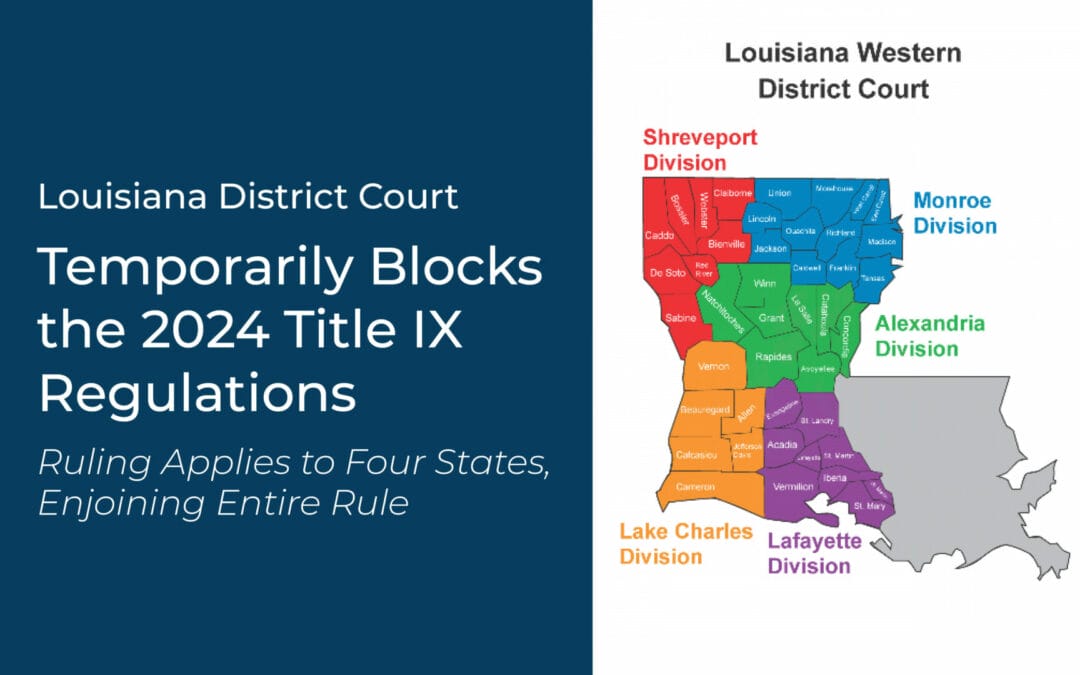By Dr. Adam Wolkoff and Joseph Storch
In the first of about a half-dozen lawsuits seeking to block implementation of the Department of Education’s 2024 Title IX Final Rule, a federal district court in Louisiana ordered the new regulations to be put on hold in four states—Idaho, Louisiana, Mississippi, and Montana.
The key issue in this decision was whether the Biden administration exceeded its authority and violated those states’ constitutional rights by requiring their schools to implement Title IX’s non-discrimination mandate beyond what the court called “biological sex” to protect individuals based on gender identity and sexual orientation.
Although the court’s grounds for enjoining the law focused on the definition of “sex” and “sex discrimination,” its injunction was comprehensive of the entire Final Rule, including its updated provisions regarding grievance procedures. Schools within those states should consult with counsel regarding whether to pause any revisions to their existing Title IX policies ahead of August 1 and/or continue to apply their existing grievance procedures pending the outcome of any appeals in this matter after the Final Rule’s effective date.
Case summary
In the 2024 Title IX Final Rule, the Department of Education relied on the U.S. Supreme Court’s opinion in Bostock to find that Title IX’s protections would extend to LBGTQIA+ individuals. The Louisiana district court, however, found that there was a split in the law about whether Bostock (which interpreted Title VII’s application to employment) applied to Title IX. The court made its own interpretation of Bostock, and decided it did not apply.
The court found that the purpose of Title IX was to remedy discrimination “against biological males and females,” holding that the meaning of “sex” fifty years ago, when Title IX became law, did not include gender identity or sexual orientation. The court’s hostility to the rights of transgender students was not veiled; in athletics, for example, it found applying Bostock’s interpretation of “sex” to Title IX “would essentially reverse the entire premise of Title IX, as it would allow biological males to circumvent the purpose of allowing biological females to participate in sports that they were unable to participate in prior to 1975.”
Along with rejecting the Department’s analogies between Title VII and Title IX in interpreting the word “sex,” it ruled (without explanation) that the Department couldn’t simply apply the Title VII “harassment standard” of severe “or” pervasive in the educational context. It found that standard was likely to chill First Amendment-protected speech, writing “the harassment standard allows for one political ideology to dominate the educational landscape while either silencing the other or calling the other ‘harassment’ under these standards.”
The court also found the Department exceeded its authority because the Rule change amounted to a “major question” that would have wide economic and political consequences around “polarizing” issues. It found the court did not have the authority to issue regulations that “change” the meaning of “sex discrimination” to include gender identity, sexual orientation, sex stereotypes or sex characteristics. It also found the regulations constituted “a new law” rather than a clarification of existing ones, and therefore violated the Spending Clause of the Constitution because the states weren’t on notice of these requirements when they accepted federal funds.
Finally, the court agreed with the states that the regulation was arbitrary and capricious in violation of the Administrative Procedures Act because it found the Department hadn’t considered the impact of its Rules on “non-binary” students and on “biological females.” Again, the court made plain its concern over the extension of rights to transgender students, speculating that by “allowing biological men who identify as a female into locker rooms, showers, and bathrooms, biological females risk invasion of privacy, embarrassment, and sexual assault.” Echoing the fears of other courts that have upheld “bathroom bans,” it wrote, “Allowing a biological male student to change to a female by simply declaring it, requiring no documentation of the change, and allowing the student to shower with cisgender females in the girls’ locker room goes beyond the scope of arbitrary and capricious.”
Severability
The district court makes no mention of and appears to conduct no analysis of the severability provisions of both the 2020 and 2024 Title IX Regulations. Page 33848 of the Final Rule discusses the continued applicability of the provision, noting the Department’s belief that each provision of the Rule constitutes an important requirement alone and that each provision is intended to work independently of the others, such that if one provision is invalidated, it would not affect the others. This is standard language in legislation and regulations. It is not clear why, for instance, invalidation of the applicability of the sex discrimination to sexual orientation and gender identity or the invalidation of the harassment definition would impact, for instance, the pregnancy and related conditions, informal resolutions, confidentiality for IRB approved research, or a number of other requirements that are not related. This is not addressed in the opinion.
What’s Next
Amid continued discussion in the U.S. Congress, other courts are conducting similar analyses and we may see additional decisions. This decision was limited to the four litigating states and other decisions may be so limited or may seek to apply a nationwide injunction. As to this case, the federal government may continue to litigate in this court and/or may appeal part or all of this preliminary injunction to the Fifth U.S. Circuit Court of Appeals. It is possible that, come August, we may have a Rule that applies to some states and not to others. This would exacerbate an unfortunate pattern of different application of certain civil rights rules in states that are led by different political parties.
Institutions are advised to consult with counsel regarding the application of this decision to their institution.
Grand River Solutions will continue to monitor this and other cases and provide briefings and updates as appropriate. Visit the Grand River Solutions New Regs Hub for comprehensive resources or reach out to speak to a Regional Director.

